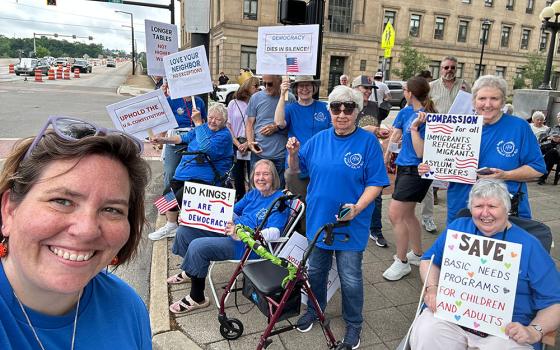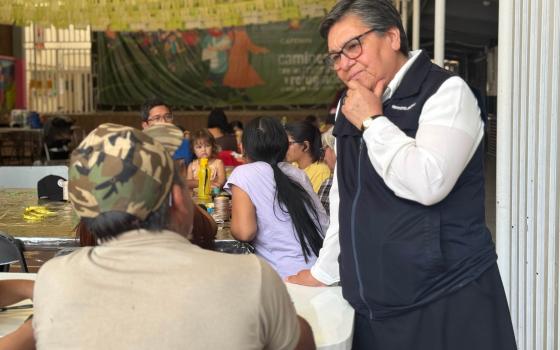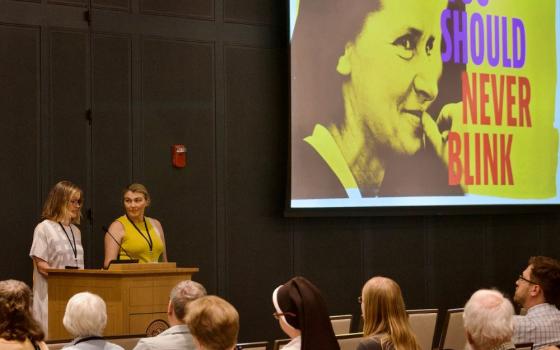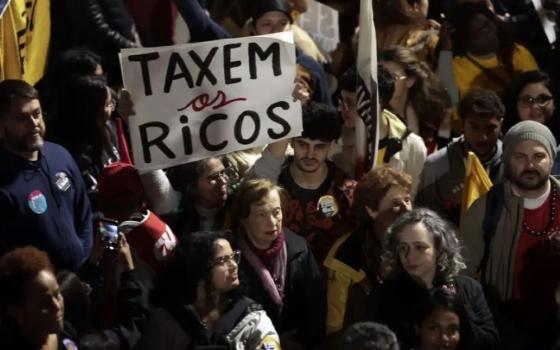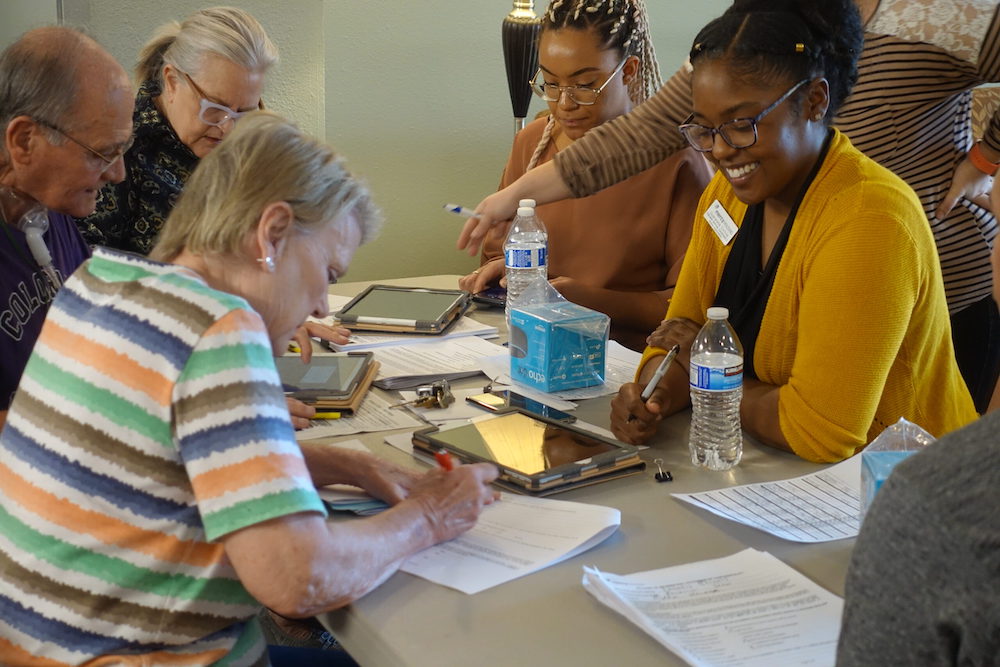
Staff help residents of the Francis Heights senior community in Denver, Colorado, sign up for Alexa Echo Dots (smart speakers) as part of an effort that began before the pandemic to reduce social isolation. (Mercy Housing)
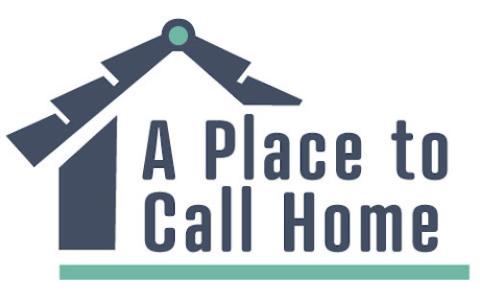
(GSR graphic/Toni-Ann Ortiz)
Editor's note: More than 1.6 billion people worldwide live in substandard housing. Of those, at least 150 million have no home at all. In this special series, A Place to Call Home, Global Sisters Report is focusing on women religious helping people who are homeless or lack adequate shelter. The series examines how homelessness and a lack of affordable housing affect teens and young adults, families, migrants, the elderly and those displaced by natural disasters and climate change in stories from Kenya, India, Vietnam, Ireland, Puerto Rico, the Philippines, the United States and elsewhere.
Eileen Carnes wasn't sure she wanted to move from the apartment she had lived in for 32 years to a senior community 20 miles further west into the Chicago suburbs.
"My son found this for me. He said, 'Mom, this is the perfect place for you,' " Carnes said. "I told him I'd miss my friends, but he said, 'You'll still have those friends, and you'll make new ones.' He was right."
Today, Carnes, 88, knows almost every resident of Colony Park in Carol Stream, Illinois — and that's the point. Colony Park, and all of the properties run by Mercy Housing Inc., are about building community, not just real estate.
"I can go among my own family and it's like I'm not even in the room sometimes. They're all deep into what's going on in their worlds," Carnes said. "But here, they make you feel like you're the most important person there is."
Mercy Housing, a sponsored ministry of eight U.S. congregations of women religious, is the largest nonprofit affordable housing agency in the country and the fourth-largest provider of affordable housing, according to Affordable Housing Finance magazine. It has more than 23,000 units of affordable housing and is home to nearly 50,000 residents across 41 states. But that is a drop in a sea of need.
An estimated 11.4 million households in the United States do not earn enough to afford housing, according to the National Low Income Housing Coalition. Those 11.4 million households are competing for just 4 million units that are affordable and available, the coalition reports.
And even those numbers may be paltry: Experts say the millions of people that the coronavirus pandemic has thrown out of work could lead to 28 million evictions of people who cannot pay their rent. By Aug. 1, the New York Times reported, 29 states were to be without bans on evictions, and the next few months could bring a tidal wave of people thrown into the street. The four-month eviction ban that covered rental housing backed by the federal government, about one-third of rental households, expired July 24.
"Housing is a human right. Food security is a human right. Water is a human right. Health care is a human right," said Sr. Linda Werthman, who chairs the board of Mercy Housing and is a member of the Sisters of Mercy of the Americas. "I heard someone say this pandemic may give us a ... chance to get right what we provide as a country. But from our communal experience as women religious, we understand that it's what you give instead of how much you can amass that matters."
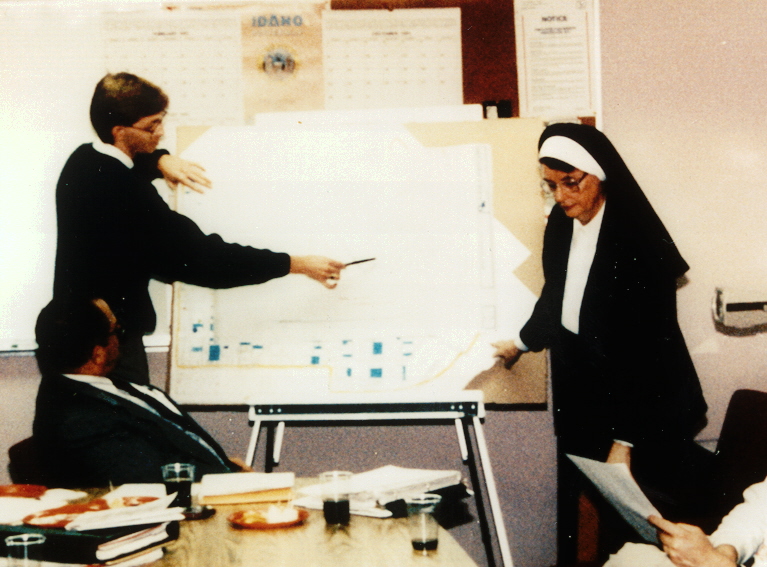
Mercy Sr. Mary Terese Tracy, the first CEO of Mercy Housing, right, in a 1980 meeting proposing a response to the affordable housing shortage in the United States (Mercy Housing)
The big picture beyond housing
Those who can't afford unsubsidized rent usually have other needs, as well, such as educational challenges, a lack of transportation, living in food deserts or a lack of affordable and accessible health care — all of which compound each other. But Mercy Housing has never been about just housing.
The original goal of Mercy Housing "wasn't to build more and more affordable housing. It was to meet the needs of people who needed affordable housing but had other needs, as well," Werthman said. While the Mercy Sisters of the early 1980s were heavily invested in health care, they knew housing was tied to many other factors, such as health and education.
"Those women knew nothing about housing except that there was a need," Werthman said. "But they knew what they didn't know, and they brought in experts to handle those things."
The agency began in 1981, when Sr. Timothy Marie O'Roark, a Sister of Mercy of Omaha, Nebraska, and a legal aid attorney, saw the conditions in which her clients lived in Omaha. O'Roark asked the congregation to make affordable housing one of its sponsored ministries. At the community's next chapter, her sisters agreed.
"With an initial investment of $500,000, the sisters made it clear that their goal with this ministry is to provide opportunities for residents to stabilize their lives and achieve their dreams," a history of the agency says on its website. "They envisioned affordable housing coupled with supportive services as a means to achieve this goal."
Mercy Housing began as a housing management agency, but a real estate professional on its first board of directors said the sisters needed to own the properties, not just run them, so they would have control and be able to leverage their capital to expand.
By 1983, they had created both a management subsidiary and a financing arm. The agency grew over the decades from an initial 310 units in Omaha to nearly 50,000 residents and 1,600 employees today, serving low-income people, seniors and those with special needs. All three types of community are aimed at meeting residents' many needs, not just their need for a place to live.
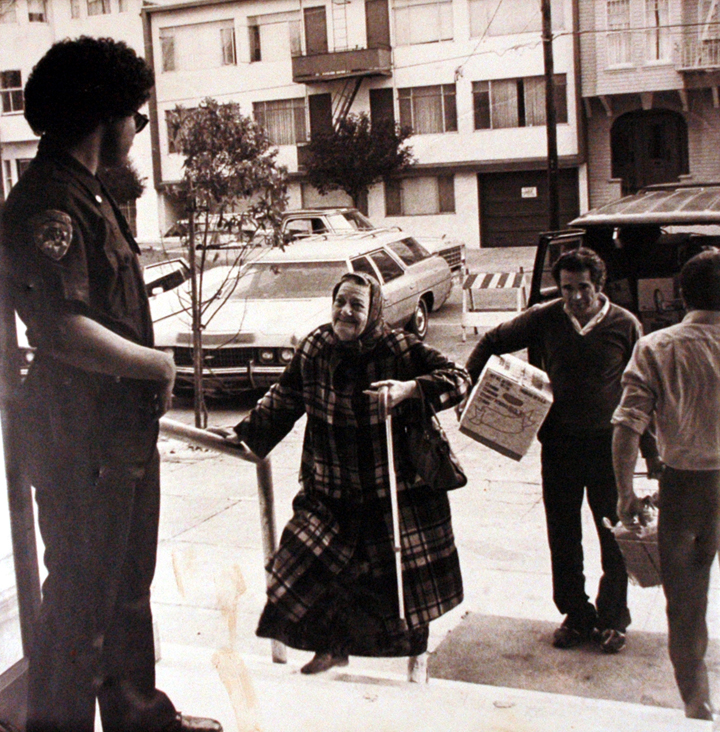
Anita, the first resident of Mercy Housing's Mercy Terrace in San Francisco, on moving day in the late 1980s. (Mercy Housing)
Keeping focus in a pandemic
The agency "was always about impacting lives in a meaningful way," said Jane Graf, who spent 33 years with Mercy Housing, including six years as president and CEO, before retiring June 30. "It's never been that it hasn't been our focus, but we recognized the need to put it front and center and make a bold statement about how we're going to get there."
Leadership wanted a strategic plan for 2020 to 2024 that would inspire residents, employees and the organization's many stakeholders, so they spent 2018 engaging with employees and residents, gauging how actions today can affect the future, and they spent 2019 creating the plan. They hired the Bridgespan Group, which advises nonprofits on social impact, to help them learn through interviews and focus groups what the real — not perceived — needs were. They found that residents want to be part of the decision-making process, not just told what their problems are.
The result, officials say, is a new focus on residents that makes their needs the heart of everything the organization does. That focus has become more important with the coronavirus pandemic, which worsened just as Mercy Housing was rolling out the plan.
Having achieved the goals of scaling up and securing financial stability, Graf said, they now can put new energy into making residents' needs the basis of everything they do.
Chief Operating Officer Michele Stowe said the resident focus means a Mercy staffer at every property calls senior residents every day to help fight social isolation. Printed materials on how to practice social distancing had to be translated into 12 different languages.
Those needs existed before the pandemic, Stowe said. But the lockdowns and quarantines and closures laid them bare and made them even more critical.
"This pandemic puts it front and center," she said.
Graf agreed.
"Things like social isolation in our senior population: That's a huge mental and physical health problem that is just exacerbated by shelter-in-place orders," she said. "This summer, how do we get kids some kind of school curriculum? What are they going to do in a family where nobody's home because the parents are essential workers? It's just really scary."
The agency used grants and donations to provide more than 1,000 laptops to students in need at various locations, but officials then had to make sure they had internet access.
"You or I can call our internet provider and pay an extra $20 a month for a while so the kids can do online school," Stowe said. "But you can't ask that of a family that's already struggling and then had a drop in income or a total loss of income."
Many residents already struggled to get nutritious food, but now, riding a crowded city bus to the store could be a life-or-death proposition for some. So officials work with food pantries, find volunteers to box up and deliver food, and coordinate food drives to bring food to Mercy properties.
The new resident focus envisioned community meetings and interaction between residents and between residents and Mercy staff — all of which had to be curtailed or stopped outright.
"For the foreseeable future, we're not going to be able to bring together groups of people," Stowe said. "So what are some different models we can use?"
The residents of Mercy Housing communities seem to have found an answer. There have been socially distant gardening and donations between neighbors of books, puzzles and healthy snacks, among other activities.
"Neighbors are getting to know each other better. They're not commuting an hour and a half to work and coming home exhausted and just want to shut the door," she said. "We're seeing communities come together safely in ways that are really lovely."
Advertisement
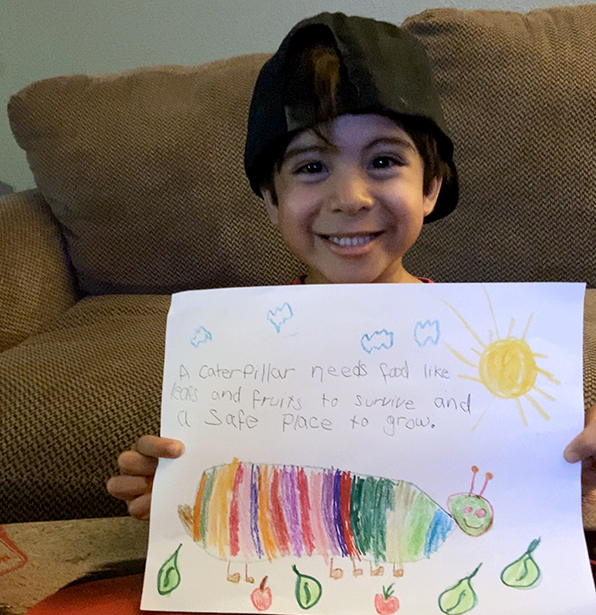
A resident at one of Mercy Housing's communities in California shows off the artwork he made as part of Camp Mercy, a four-week interactive, virtual summer program that began July 7 for students in first through 10th grades. More than 300 students at 40 communities registered for the project-based learning program designed to keep them from falling behind academically during the coronavirus pandemic. (Mercy Housing)
'They really spoil us'
Werthman said O'Roark's simple declaration about the conditions her clients lived in — "We can do better" — is still the driving force for Mercy Housing's employees.
"[The agency] is huge, but I have to say, even before the pandemic, the key is that idea of residents being our North Star," Werthman said. "How do we listen to our residents and hear their needs and then meet them? ... We pride ourselves on resident services, but we needed to come back full circle to why Mercy Housing was started."
Colony Park resident Carnes said the immaculate grounds and buildings and the care the staff has taken to keep residents safe during the pandemic are all wonderful, but the community is what really sets the complex apart.
When Carnes first moved in almost five years ago, the community was owned by the Wheaton Franciscans; in 2017, the order transferred 33 complexes to Mercy Housing as they let go of corporate ministries. Carnes said things were great with the Franciscans and even better with the Mercy Sisters.
"They send us puzzles. There's always something on the door — a bag of food or a letter with news of what's happening. They really spoil us," she said. "Everybody is so kind. They worry about us. It's so caring."
Her neighbor Bessie Bray, 76, said you can't fake caring and appreciation.
"The people in the office are genuine," Bray said. "They're working on stuff for us all the time."
Maintaining community is difficult when people can't be together for fear of spreading COVID-19, so Colony Park staff members initiated events such as Music Mondays, when they stand outside each building with a karaoke machine and sing and dance to the residents, who join in on upbeat songs like the Village People's "YMCA" from their balconies.
"I yelled, 'You know, you need to practice,' " Bray said. "One of 'em yelled back, 'Come down and join us.' "
The pandemic precautions are especially appreciated, Bray said, because less than 3 miles away, a senior complex had 116 cases of COVID-19 and 20 deaths. Colony Park had one case and no deaths.
"I don't think I could live anywhere else," she said. "I have a friend that lives downtown, and I tell her, 'I did this' and 'we did that,' and she says, 'We don't have that.' "
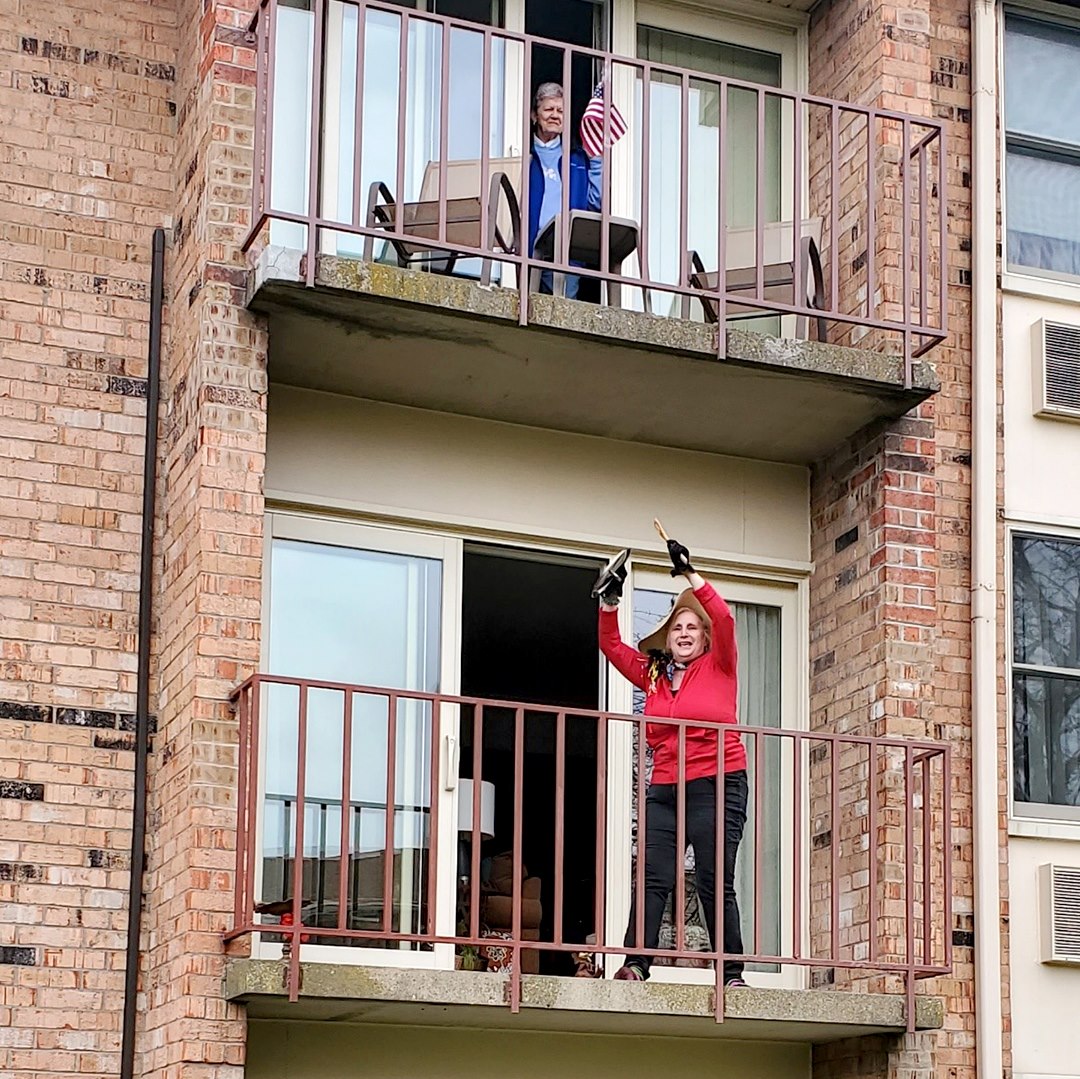
Music fills the air at Colony Park in Carol Stream, Illinois, where senior residents participated in a song-and-dance event from the safety of their balconies while staff sang and danced to a karaoke machine below. (Mercy Housing)
[Dan Stockman is national correspondent for Global Sisters Report. His email address is dstockman@ncronline.org. Follow him on Twitter or on Facebook.]
Sisters in housing ministry around the world
When GSR developed A Place to Call Home, we knew our series would not be able to fully encompass sisters' work internationally. We wanted to include the efforts of as many sisters as possible who are addressing homelessness and/or affordable housing issues. So we created a questionnaire so you could tell us how you, your community, or sisters you know are giving others a place to call home.
So far, we have received more than 80 responses, which we used to create this interactive map showcasing sisters' work. Don't see your community here? Please add to our map, by filling out our questionnaire here.

